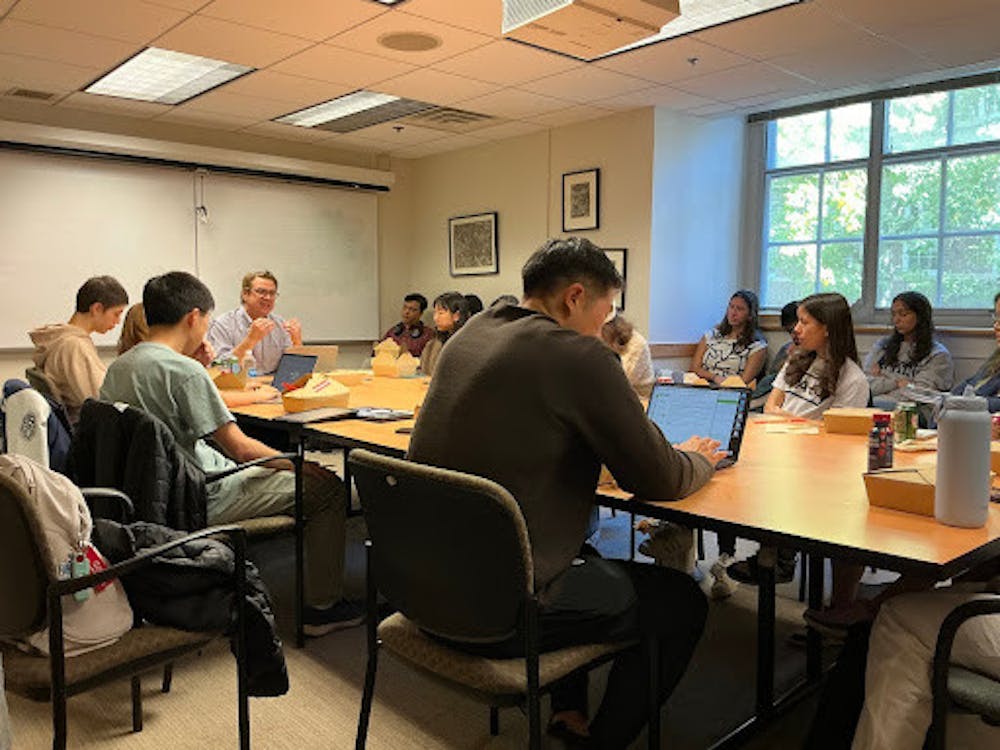The Aronson Center for International Studies, in collaboration with the International Studies Leadership Council (ISLC), hosted the last event of their Fall 2024 Speaker Series, titled “Faculty Fridays: A New World Ahead,” on Friday, Oct. 25. The event featured a discussion by Professor Bentley Allan — an associate professor of political science — regarding the evolving dynamics of global climate governance.
In an email to The News-Letter, Akshat Sinha and Qingxi Wang, co-presidents of ISLC, discussed the impetus for inviting Allan to host a discussion on climate policies and their goal of generating meaningful discussion of global issues amongst Hopkins students.
“Climate change has prompted contentious and urgent debates...It is important to have a grounded conversation about the future of environmental policies,“ they wrote. “Professor Allan is currently teaching a course titled Climate Solution: the Global Politics and Technology of Decarbonization, [so he] can inform students about the actors involved, the process, and the politics in forming environmental policies.”
Allan began the talk by outlining the history of global climate governance, starting when scientists became confident about global warming in the 1980s. Allan recounted the failure of the 1997 Kyoto Protocol, a treaty by nations establishing binding targets to reduce greenhouse gas emission, and outlined the efforts leading to the 2015 Paris Agreement.
“[Countries] couldn’t even agree on the rules are for implementing the treaty, so they knew something needed to come after the Kyoto Protocol,“ he said. “Twenty-five years later, the Paris Agreement’s formal structure still mimicked what the Japanese proposed, but now there was a focus on clean technology, such as solar panels.”
Allan then transitioned the discussion to China’s strategy for combating climate change and out-competing Western economies. He described that due to China’s initiative to control clean energy supply chains, such as the production of batteries, the West sought to reform its own industrial policies to create domestic supply chains and safeguard its economic interests.
“[Initially], we were happy to have China be the workshop of the world... but now countries in the West have started to sit up and take notice,“ he said. “In fact, the French foreign minister believed making batteries in Europe is a matter of economic sovereignty.”
Previous speakers in the Fall 2024 speaker series, included Professor Steven R. David, who considered foreign relations between the U.S. and China, and Professor Julian Lim, who discussed past and present migrations at the U.S-Mexico border.
Focusing on the United States’ efforts, Allan then described that the American government is aiming to establish its own battery supply chains in pursuit of a greener future.
“The Biden administration green-lighted a big new lithium mine in Nevada, which will provide 15% of the lithium needed for the U.S. battery industry. Abroad, the United States is also going to its allies to make sure they can build their mining capacities as well,“ he said.
Allan concluded his talk by highlighting the importance of climate action to the global politics.
“International politics in the economic realm is a lot more interesting because countries are finally competing, and there’s something truly at stake, which is whether or not we actually solve climate change,“ he explained. “This challenge has moved from a world where nobody really cares to becoming the basis of global relations.”
The event then shifted into a Q&A format, allowing attendees to ask Allan specific questions. Allan first responded to a question on the progress of U.S. efforts to build strong supply chains, explaining that, while the U.S. aims to develop its industrial base, it relies heavily on strategic international partnerships to secure essential resources and capabilities.
He pointed to collaborations with countries like Saudi Arabia, the United Arab Emirates (UAE), and South Korea as key examples, and highlighted that the U.S. has encouraged allies to invest in mining operations abroad, such as a recent half-billion-dollar investment by the UAE in a Zambian copper mine. Notably, he underscored the benefits of trade in allowing nations to specialize and contribute effectively to the global supply.
“We found that 65% of the supply chain is going to have to be sourced internationally, even though the U.S. is rapidly developing its own industrial base,“ he said. And that’s good because countries can specialize in different things, like the Koreans with high-tech chemistry innovation.”
Moreover, Allan also addressed that future foreign policies will depend on the results of the upcoming election. Allan predicted Vice President Kamala Harris would continue the Biden administration’s internationalist foreign policy to build a domestic supply chain, while former President Donald Trump would emphasize greater competition.
“Harris had not commented much on foreign policy, but we expect she’ll keep most of the staff in critical positions in critical positions,“ he said.
Attendees appreciated the series’ focus on real-world issues, allowing them to practically apply the theory and history learned in classes. In an interview with The News-Letter, sophomore Roseliane Corona — the chair of the ISLC Marketing Committee — reflected on the event.
“When you’re first starting out in the International Studies department, most of the classes teach you about historical analysis, and I think we forget that they can be applied to present times as well,“ she said. “It was really cool that we got to see a contemporary topic.”
Mai Dang, a sophomore majoring in International Studies, also commented on the importance of the event in educating Hopkins students about global conflicts.
“These kinds of topics are important for students of all majors [so that] they understand our world today, particularly U.S.-China tensions due to its global importance,“ she said.





